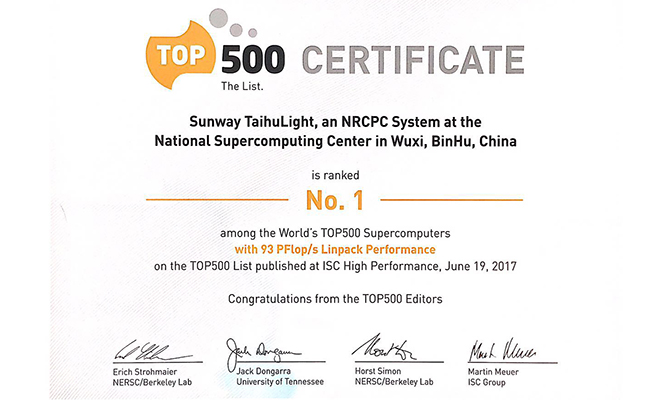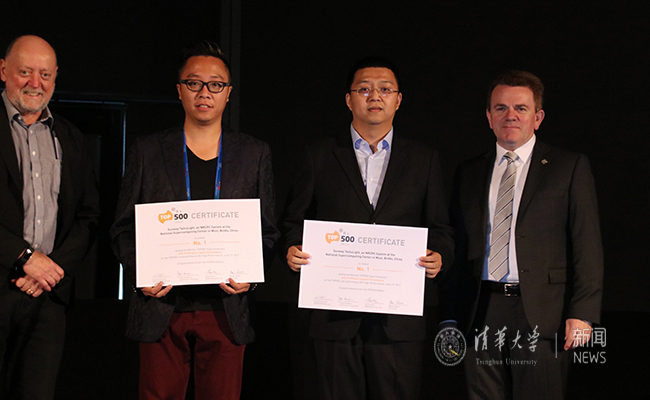The "Sunway TaihuLight" supercomputer run by Tsinghua University is again ranked first in the TOP500 list of supercomputers
At 17:00 on June 19, the semiannual TOP500 Supercomputer list released at the ISC High Performance conference (ISC) in Frankfurt, Germany once again recognized China’s Sunway TaihuLight as the world’s fastest supercomputer, with 93 petaflops (quadrillions of calculations) per second on the LINPACK benchmark. This is the third time that the Sunway TaihuLight has topped the TOP500 list since 2016.

The Sunway TaihuLight computer system developed by the National Research Center for Parallel Computer Engineering and Technology (NRCPC) is hosted by the National Supercomputing Center in Wuxi. In 2016, the City Government of Wuxi, Tsinghua University, and the Industrial Technology Research Institute of Jiangsu Province signed a joint agreement regarding the management and operation of the National Supercomputing Center in Wuxi. This agreement takes advantage of Tsinghua University's globally renowned research facilities and staff to support software development, promote applied supercomputing, train young scientists, conduct scientific research, and provide social services. This collaborative center for scientific and technological innovation was established as a high-level platform for innovative supercomputing applications and industrial cooperation. Professor Yang Guangwen of the Department of Computer Science was chosen to serve as the director of the Center and Associate Professor Fu Haohuan of the Department of Earth System Science was chosen as deputy director.
Researchers from Tsinghua University have now been using the Sunway TaihuLight supercomputer system for more than one year. The supercomputing facilities at Wuxi have been applied to study weather, aerospace, biomedicine, materials science, new energy, and 19 other areas. These activities support national scientific and technological objectives, and have enabled a number of key advances in manufacturing and other fields. Over the past year the supercomputer has completed more than 200 million computing tasks, nearly 7,000 computing tasks accomplished per day.

In 2016, three scientific applications from the Sunway TaihuLight supercomputer were selected as finalists for the Gordon Bell Prize, the most prestigious international award for high performance computing applications, altogether accounting for half of the six total nominations worldwide. One of these applications, which was co-developed by Associate Professor Xue Wei of the Department of Computer Science, Associate Professor Fu Haohuan of the Department of Earth System Science, Dr. Gan Lin of the Department of Computer Science, and researchers from other institutes in China, won the 2016 Gordon Bell prize. This was the first time that a Chinese research team had won the prize in its 29-year history, and is an important milestone in the history of high-performance computing in China. This success illustrates the ability of the Sunway TaihuLight to support cutting-edge scientific applications.
This year, two applications developed based on the Sunway TaihuLight system (a redesign of CAM-SE for the Sunway architecture and a 15-Pflops non-linear earthquake simulation) have again been selected as finalists for the Gordon Bell Prize. These two applications will compete for the prize in the SC17 conference in the United States later this year. Both applications were led by Associate Professor Fu Haohuan of the Department of Earth System Science and completed in cooperation with Professor Yang Guangwen, Associate Professor Xue Wei, and postdoctoral research scientist Gan Lin of the Department of Computer Science.
The Sunway Micro, a commercial Sunway solution that can be fully customized to meet customer needs, was also announced at the ISC High Performance conference. The release of the Sunway Micro marks a starting point for transforming the world-leading technologies embodied in the Sunway TaihuLight into commercial success in the form of domestic HPC solutions. Customizable HPC technologies like the Sunway Micro will play a central role in the continued development of high-performance computing research in China and promote the further expansion of supercomputing applications across multiple fields of science and industry.

